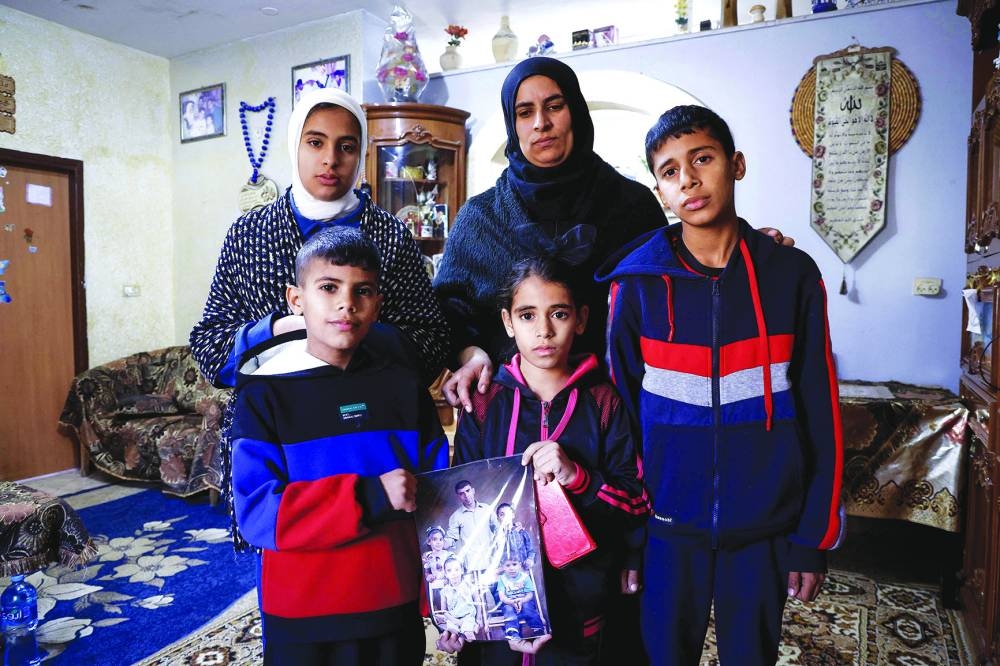Moussa is eight years old and really likes marbles. But for the past month, this Palestinian boy, living in the occupied West Bank, has a new game: “Pretend daddy isn’t dead.”
He calls his dad, imagines what he did with his day, and acts like he’s suddenly going to run into him.
But his father, Bilal Saleh, was killed on October 28.
The 40-year-old was shot in the chest while picking olives with his family near his home in the village of As-Sawiyah.
Saleh is one of more than 250 Palestinians killed by Israeli soldiers and settlers in the West Bank, according to a Palestinian government tally, since Hamas’ storming of Israel in the first week of October.
“He was a simple man, attached to his land,” says his widow, Ikhlas, showing images on her phone of Saleh in the fields, reciting the Qur’an with Moussa and at a wedding. She struggles to even look at them, let alone tell the story of what happened.
The children pressed around her to fill in the details.
Videos from the scene show four men wearing the knitted yarmulkes that are popular among Israeli settlers, shouting towards the family as they are harvesting.
One is armed with an automatic rifle.
The family flees, but Saleh has forgotten his phone and runs back to fetch it. A few minutes later, a gunshot rings out. The family rushes back to find Saleh bleeding from the chest.
He was taken to a hospital about 10 kilometres away but declared dead soon after.
The family says Ikhlas’ brother and father saw on social media that a man had been arrested for the shooting but released a few hours later. The police and Cogat, an Israeli defence ministry body overseeing civilian activities in the Palestinian territories, did not respond to multiple requests for comment from AFP.
A few days later, without knowing why, Ikhlas was called to a police station in Ariel, a neighbouring Israeli settlement, where police asked her to explain what she saw. “At the entrance, while a guard was checking my identity papers, a settler drove by. He saw that I was veiled and he rolled down his window to spit on me,” she said. “After that, I don’t see what kind of justice they could give us,” she added.
Israeli human rights group Yesh Din convinced her to file a complaint anyway, though it says a study of settler violence cases between 2005 and 2021 showed 92% were dismissed by the Israeli authorities.
“For the past 10 years, it has been getting more and more serious,” said Hazem Saleh, Bilal’s brother-in-law. “We are being attacked, our land is being taken from us, settlements are being built. They have the power, they can do what they want.”
But it has been “even worse”, he said, since Hamas fighters from Gaza stormed southern Israel.
In retaliation, Israel declared war on Hamas and launched a large-scale military offensive in Gaza, which has killed nearly 15,900 people, two-thirds of them women and children, according to the Hamas authorities.
Israel has also relaxed laws on access to weapons, promising to arm Israeli civilians in at least 1,000 localities, including settlements. On Saturday, settlers opened fire on a 38-year-old Palestinian in the village of Qarawat Bani Hassan, according to the Palestinian Wafa news agency.
The As-Sawiyah residents’ WhatsApp group is a litany of fear and violence.
Mouna Saleh, 56, Bilal’s mother-in-law, fears for the children, especially Moussa and Mayce “who are so small — what can we explain to them?”
“How can you kill a man in a few seconds, in front of children? What is this world?” she said.
“We’re not calling for violence or revenge. We call for peace, justice, mercy,” said Hazem.

Ikhlas, the widow of Bilal Saleh, poses with her children as they hold a picture of their late father at the village of As-Sawiyah, south of Nablus in the occupied West Bank.
